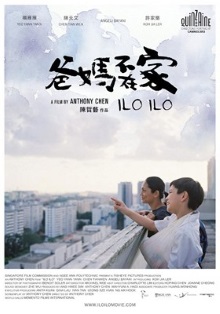
This film was Singapore’s submission for the 2013 Academy Awards for the Best Foreign Language Film category. It is also the first Singaporean film to win an award at the Cannes Film Festival, bagging the Camera d’Or award meant for début directors. This makes it the highest profile Singaporean film of recent years. I was particularly curious about how it stacks up compared with The Journey, arguably its closest Malaysian equivalent.
Set during the height of the 1997 Asian financial crisis, it tells the story of a middle class Singaporean family of three. Exasperated by their unruly son, the two working parents reluctantly hire a Filipino maid to help take care of him. The child Jiale is upset at first, especially when he learns that he has to share his room in their small apartment with the maid, Terry. But predictably Jiale soon forms a bond with Terry and she becomes part of the family.
Completely bereft of a soundtrack until the very end, Ilo Ilo has an authentic, starkly honest feel. The actors and actresses have minimal make-up and wear unglamorous, everyday clothing. Props like a Tamagotchi and electronic typewriters remind us that we are in the 90s. Similarly, the cinematography is intimate and unprepossessing, lending the film dramatic weight. These are scenes of ordinary life that both Malaysians and Singaporeans will find instantly familiar.
For the most part the progression of the plot proceeds along completely expected lines. There are some inspired moments, such as when Jiale berates Terry for abandoning her own baby to work in Singapore and Terry asks in turn why his own mother would entrust his care to a stranger. But such original touches are comparatively rare. Most scenes, such as the father losing his job and attempting to hide it from the family, or Terry being accused of smoking when it is Jiale who is experimenting with cigarettes, are nothing we haven’t seen before.
Yet even if the film lacks true creativity, there is something to said for an honest, if familiar, story told well. The acting is top notch with child actor Koh Jia Ler being both photogenic and able to hold his own. The pacing and writing are both competent. There are no mistakes or moments that ring false. This is why the film is so effective in engendering our sympathy for the family and their travails.
It is also effective because it frankly discusses uncomfortable truths about everyday Singaporean life. For all that foreign maids may well find some measure of happiness while living together with the families who employ them, the relationship never stops being awkward and at least a little unhealthy. Contrast that with how The Journey refuses to say anything bad about life in Malaysia at all.
There are many ways in which Ilo Ilo could have been a better film. It could have used more cogent dialogue or more original insight. If Terry had stayed longer with the family, the story would be thematically richer and deeper. At the same time, this remains a film that its director should be proud of. It is a solid, well-made film that perfectly captures the era it is set in and the life of a typical Singaporean family with a live-in maid. As usual, Malaysia has a lot of catching up to do.
2 thoughts on “Ilo Ilo (2013)”